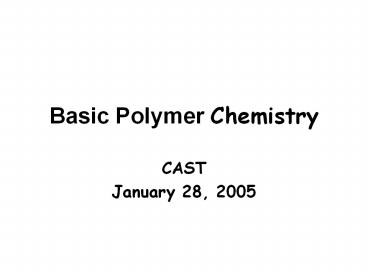Basic Polymer Chemistry CAST January 28, 2005 Presenters Jon - PowerPoint PPT Presentation
1 / 24
Title:
Basic Polymer Chemistry CAST January 28, 2005 Presenters Jon
Description:
Basic Polymer Chemistry CAST January 28, 2005 Presenters Jon Valasek St. Marks School of Texas Dallas valasekj_at_smtexas.org Debbie Goodwin Chillicothe High School ... – PowerPoint PPT presentation
Number of Views:37
Avg rating:3.0/5.0
Title: Basic Polymer Chemistry CAST January 28, 2005 Presenters Jon
1
Basic Polymer Chemistry
- CAST
- January 28, 2005
2
Presenters
- Jon Valasek
- St. Marks School of Texas
- Dallas
- valasekj_at_smtexas.org
- Debbie Goodwin
- Chillicothe High School
- Chillicothe, MO
- nywin_at_hotmail.com
3
Polymer Ambassadors
- www.polymerambassadors.org
- Mission Statement
- The Polymer Ambassadors, with resources from
educational, industrial, and professional
societies, promote polymer education with
teachers, students, and community audiences.
4
Materials Science Teacher Camps
- Sponsored by ASM International Foundation
- http//www.asminternational.org
- Click on Foundation tab
- Click on Materials Camp tab
- One week in the summer
- No cost
5
MST Summer Camps
- Albuquerque, NM Eldorado High School June 12 -
16 - Ann Arbor, MI U of Michigan July 17 - 21
- Calgary, Canada S Alberta Institute Tech August
21 - 25 - Charlotte/Monroe Wingate University June 19 -
23 - College Park, MD U of Maryland June 27 - 30
- Columbus, OH Ohio State University TBA
- Dallas, TX University of Texas July 17 - 21
- Denver, CO Colorado School of Mines June 26 - 30
- Edmonds, WA Edmonds Community College July 17 -
21 - Edmonton, Canada University of Alberta July 24 -
28 - Gainesville, FL U of Florida June 26 - 30
- Houston, TX U of Houston June 26 - 30
- Long Beach, CA California State University July
10 - 14 - Piscataway, NJ Rutgers University August 7 - 11
- Toronto, Canada University of Toronto August 14
16 - Youngstown, OH Youngstown State University July
17 - 21
6
Polymers
- Poly many
- Mer - parts
- Long chain molecules made of many smaller
repeating units
7
Classification
- Natural vs. Synthetic
- Type of Polymerization
- Addition
- Condensation
- Response to Heat
- Thermoplastics
- Thermosets
8
Where do polymers come from
- Natural gas
- Linked together by polymerization
- Start with C2H4
H
H
C
C
H
H
9
(No Transcript)
10
Carbon Chains and Boiling Temperatures
- Petroleum gas - used for heating, cooking, making
plastics - small alkanes (1 to 4 carbon atoms)
- commonly known by the names methane, ethane,
propane, butane - boiling range less than 104 degrees Fahrenheit
/ 40 degrees Celsius - often liquified under pressure to create LPG
(liquified petroleum gas) - Gasoline - motor fuel
- liquid
- mix of alkanes and cycloalkanes (5 to 12 carbon
atoms) - boiling range 104 to 401 degrees Fahrenheit /
40 to 205 degrees Celsius - Kerosene - fuel for jet engines and tractors
starting material for making other products - liquid
- mix of alkanes (10 to 18 carbons) and aromatics
- boiling range 350 to 617 degrees Fahrenheit /
175 to 325 degrees Celsius - Gas oil or Diesel distillate - used for diesel
fuel and heating oil starting material for
making other products - liquid
- alkanes containing 12 or more carbon atoms
- boiling range 482 to 662 degrees Fahrenheit /
250 to 350 degrees Celsius - Lubricating oil - used for motor oil, grease,
other lubricants - liquid
11
Chain Lengths
- Beaded chain
- 10,000 carbon atoms typical polyethylene
molecule
12
(No Transcript)
13
Polymerization Making Chains
- Addition polymerization
- Connecting monomers without producing a
by-product - Usually involves breaking a double bond
- Requires an initiator
- Hand-holding simulation chain reaction
14
(No Transcript)
15
(No Transcript)
16
HDPE vs. LDPE
- Chains
- Density
- Crystalline vs. amorphous
17
(No Transcript)
18
(No Transcript)
19
Polymerization Making Chains
- Condensation Polymerization
- Method of forming molecules between 2 different
monomers - A smaller molecule is also formed as a by-product
- Also known as a step reaction
- Example PETE
- Nylon demo
20
Holding chains together
- covalent bonds stronger ex. rubber
- intermolecular forces weaker ex. slime
- entanglement ex. HDPE
- (analogy 50 pieces of yarn each 6 feet long
jumble and wad them up throw them down in a
pile on the ground try to pull out one piece
what happens???)
21
Slime
- 4 Polyvinyl alcohol solution
- Add different amounts of 4 borax solution to 50
mL of PVA solution - 2
- 4
- 8
- 12
- 20
22
Slime
- Analyze and compare
- Viscosity (ability to flow)
- Coolness (evaporative cooling)
- Elasticity (return to shape after stress)
- Plasticity (retains new shape after stress)
23
Polyvinyl Alcohol
- Math
- evaporation
- Viscosity
- Temperature change
- Hospital
- Laundry bags
- Industry
- Mold release
24
Additional Labs Demos
- Sodium alginate snakes
- Gak
- Latex balls
- Happy/sad balls
- Others.































